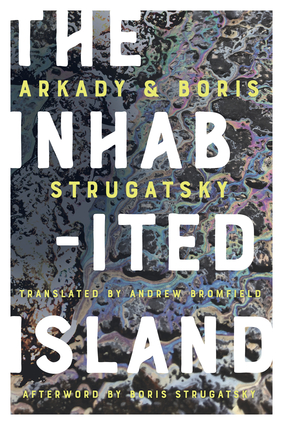Overview
A masterly and frightening tale of space exploration, newly translated from the uncensored edition
When Maxim, a space explorer from Earth, accidentally discovers a planet inhabited by humanoids who destroy his spaceship, he thinks of himself as a modern-day Robinson Crusoe. But after his experiences in the planet’s nightmarish military and mental health facilities, he begins to realize that his sojourn on this radioactive and war-scarred world will not be a walk in the park.
The Inhabited Island is one of the Strugatsky brothers’ most popular and acclaimed novels, yet the only previous English-language edition was based on a heavily censored version. Now, in a sparkling new translation by award-winning translator Andrew Bromfield, this landmark novel can be newly appreciated by both longtime Strugatsky fans and new explorers of the Russian science fiction masters’ astonishingly rich oeuvre.
Reviews
“With its harsh portrayals of nuclear devastation and demented autocracy, this book is bound to spark curiosity about the political purposes of Soviet science fiction. . . . The narrative proceeds with a clarity and firmness not quite like anything in even the finest American science fiction. . . . A work of unmistakable stature.” —Kirkus Reviews on Prisoners of Power, the previous English translation of The Inhabited Island
“Bromfield’s masterly translation manages to preserve layered language. . . . Highly enjoyable and impossible to compare to any other work.” —Publishers Weekly on Monday Starts on Saturday, translated by Andrew Bromfield
Author Biography
Arkady and Boris Strugatsky were famous and popular Russian writers of science fiction, with more than twenty-five novels and novellas to their names, including The Doomed City, Hard to Be a God, Monday Starts on Saturday, Roadside Picnic, and The Snail on the Slope. Their books have been widely translated and made into a number of films. Andrew Bromfield has translated into English works by Victor Pelevin, Boris Akunin, Sergei Lukyanenko, Mikhail Bulgakov, Daniil Kharms, Leo Tolstoy, and the Strugatsky brothers.
 Mother's Day
Mother's Day Father's Day
Father's Day
